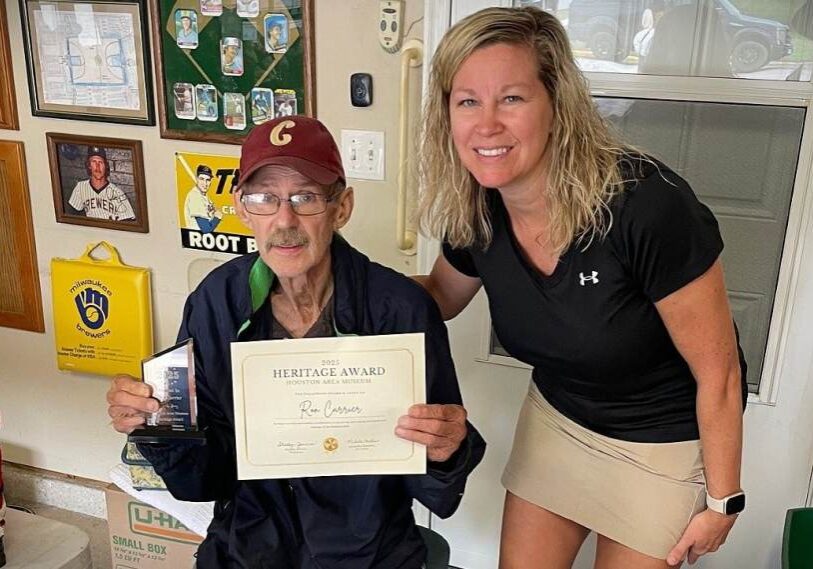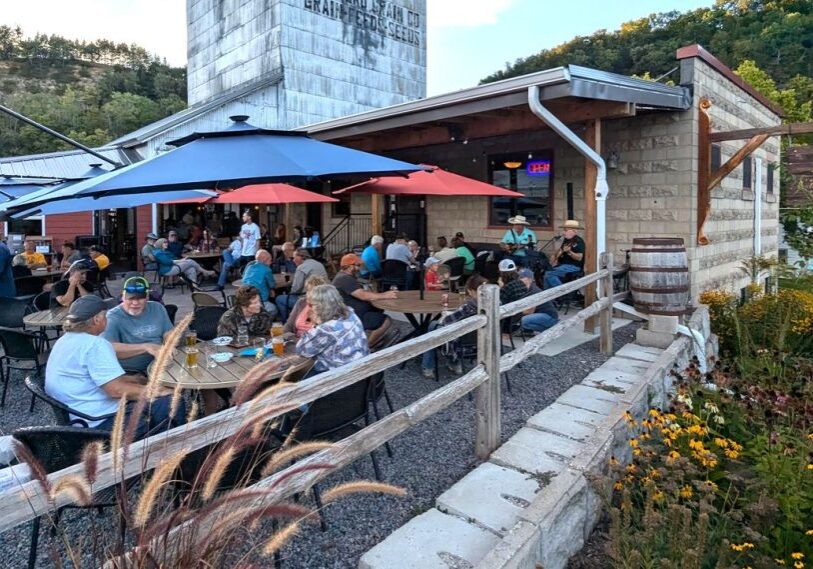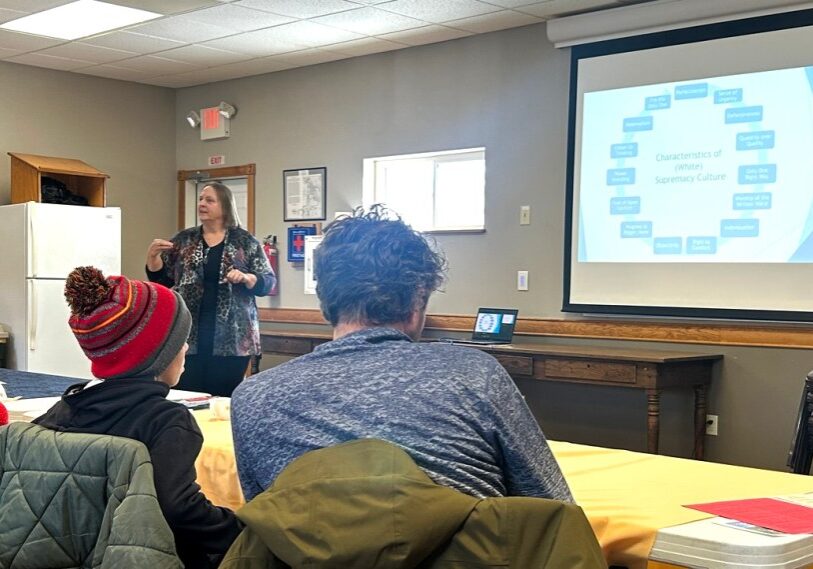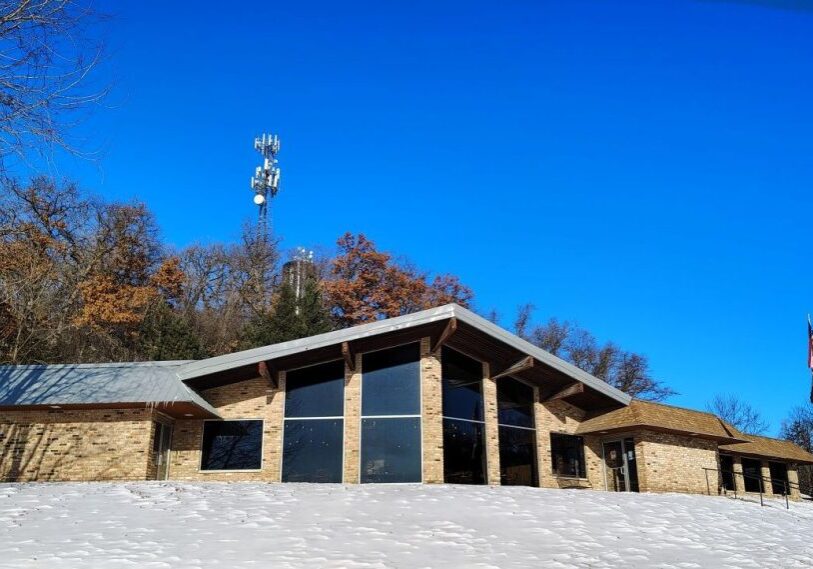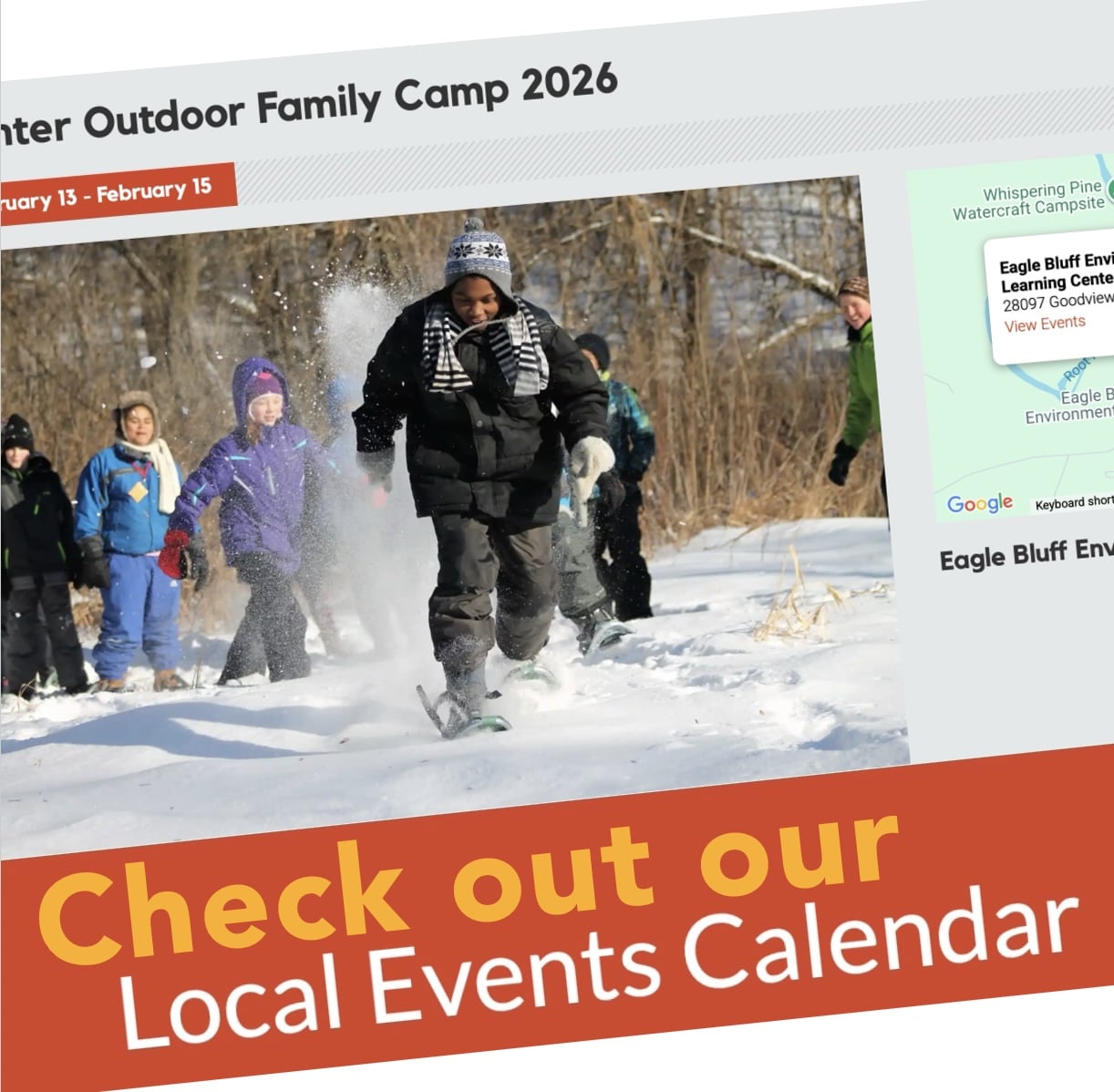Essay | When Summertime Was Paradise

LANESBORO — In the 1950’s when I was a kid, I used to visit my grandparents in the small town of Lanesboro. We’d drive the 250 miles from Milwaukee on what was U.S. Highway Route 16. The trip could be boring, with nothing to do but count telephone poles or cows.
But once we got to the start of Bluff Country in western Wisconsin, I knew it wouldn’t be much longer. Soon all the familiar towns came and went. La Crescent, Hokah, Houston, Rushford, Peterson, Whalan…then the turn onto Coffee Street and we were there!

Pictured, left to right, are Don Bell’s Aunt Lois, his grandfather Howard Shattuck, and his mother. (Photo courtesy of Don Bell)
At the end of the Flat was Grandma and Grandpa Shattuck’s house. As soon as we had said “hello”, I’d run across the street to see if T.J. Lynch was home.
TJ’s dad, Tommy, raised horses and sometimes he’d be shoeing a horse in the barn next to the house. His mom, Mabel, might say, “No, TJ is out delivering newspapers. He’ll be back soon” I’d run back to the house and tell my mom that I was going “uptown” to Grandpa Howard’s shoe store.
Lanesboro in the summertime was a paradise for a kid. You could go anywhere in town and not get lost. If you were up to some mischief, someone would call the house and your misdeeds would be reported. “Esther, your grandkids are climbing on the railroad bridge.”
I’d follow the railroad side up to the lumber yard and up to the main drag past Hanson’s Drug Store and Hank’s Café and finally to Grandpa’s shop. I’d keep an eye out for TJ or one of the other kids I knew.
The Shattuck Leather Store was located on Main Street (Parkway) next door to the State (St. Mane) Theater until the late 40’s. The store’s final location was in a storefront now occupied by Amish Experience, below the Odd Fellows Lodge.
When you opened the front door, a buzzer went off in the back room. If the buzzing went on for more than a few seconds, Grandpa would holler, “Close the door!” without looking up from his work.
The minute you walked in the door you were greeted by the smell of leather, shoe polish, glue and cigar smoke. Grandpa always had a cigar going but he spent more time chewing than smoking.
Sometimes, when he was reading the paper at his desk, he would light up the slightly soggy cigar and a cloud of smoke would rise from behind his newspaper.
Grandpa would ask how the trip was and if I was hungry. When he finished the shoes he was working on, he would hang up his apron and take me down to Jack’s Café for a doughnut and a glass of milk. My Grandma would holler at him later for “spoiling the boy’s supper”.
Taking me aside, Grandpa advised that the less I told my grandmother the better it would be for both of us.
Fishing and more fishing
One afternoon, Grandpa took me out to the fish hatchery. He handed me a cane pole, baited with a minnow and told me to try my luck. As soon as the minnow hit the water, I had a trout on my hook. A few minutes later, we had several trout wrapped in newspaper to take home for supper.
My mother complained that the fish tasted like the liver pellets used for feed at the hatchery. I thought nothing tasted better than fish you caught yourself.
One of the occupations of summer was fishing. I’d get up early and go to Sylvan Park and fish for little blue gills in the pond. I’d sit out on the island in the middle, using canned corn for bait. Sometimes, I’d dig up worms from Tommy Lynch’s manure pile.
Grandpa made me promise that I wouldn’t go fishing in the Root River by myself. He was concerned I might fall in. He told me that if I caught some big catfish, it would probably drag me right into the river. The prospect of catching some huge fish was one of my dreams, but not one that ever came true.
On rainy days, I could hang out in the waiting room of the Shattuck School of Music and read comics while my grandmother, Esther Shattuck, gave lessons or practiced the organ. She was the organist for the Methodist Church.
In two small rooms behind the Drug Store, Grandma taught piano, accordion and organ. When that got boring, I would go up to the shoe store and hang out.
Shattuck Leather Store
There was a fellow named “Doc” Russell who had desk space in the store. He sold insurance or real estate or horses or something, I wasn’t sure. I came in one day when he was in the middle of telling a story about some big deal he had just concluded. Grandpa turned to me and said, “It just goes to show that if hard work made you rich, we’d all be blacksmiths.”
One of the other exchanges I heard between those two was in response to an obituary that Doc read to him. Grandpa’s response was, “Another fool who told me drinking would kill me.”

Fred Shattuck, Don Bell’s great-grandfather, is pictured working on leather. Fred started Shattuck Leather Store and taught his son Howard leather making. (Photo courtesy of Don Bell)
I often just sat and watched while Grandpa would put new half soles on a pair of shoes or rivet new oak slats on a binder canvas for some farmer’s hay baling machine. Or put new clasps and handles on a suitcase.
Grandpa learned the leather business from his dad, my great-grandfather, Fred Shattuck. In the back room was a long narrow workbench with all the tools and equipment for making harnesses.
The harness business was another relic from a different era but there were still times that he would make a harness set for someone.
There were barrels full of brass buckles and fittings. There was a slitting machine and embossing rollers.
Every once in a while I would get a new belt for my jeans, made of oak tanned leather with a brass buckle.
One day, I watched as he worked on making a pair of shoes. He had been trained as a shoemaker but I never saw him making shoes before. He showed me how you soaked the leather in water to soften it. Then you stretched it over the wooden form and nailed it in place.
When he put it aside to dry I asked him who he was making the shoes for? “Your Grandma” was the reply. “When will they be finished?” I asked. “One of these years,” was his answer.
I asked if he could make shoes for anyone and he explained that the wooden forms were called “lasts” and you needed a pair of lasts to fit the feet of the person. It occurred to me that you would need hundreds of pairs of lasts to make shoes for everyone in town.
I asked where he kept all the lasts. He said that the ones that fit my Grandma were the only ones he had left. They had burned the rest in 1933 for heat. When the Depression came, no one could afford to have shoes made to order any more.
Grandpa Shattuck died at work in his store in 1959. I don’t believe he ever finished the shoes for my Grandmother.
The contents of the store were auctioned off after the funeral and it raised just enough money to pay off the loan he had taken out in 1933 to survive the Depression. He had only been able to pay the interest for all that time. Hard work, as it turned out, didn’t make you rich.
© Don Bell 2023
